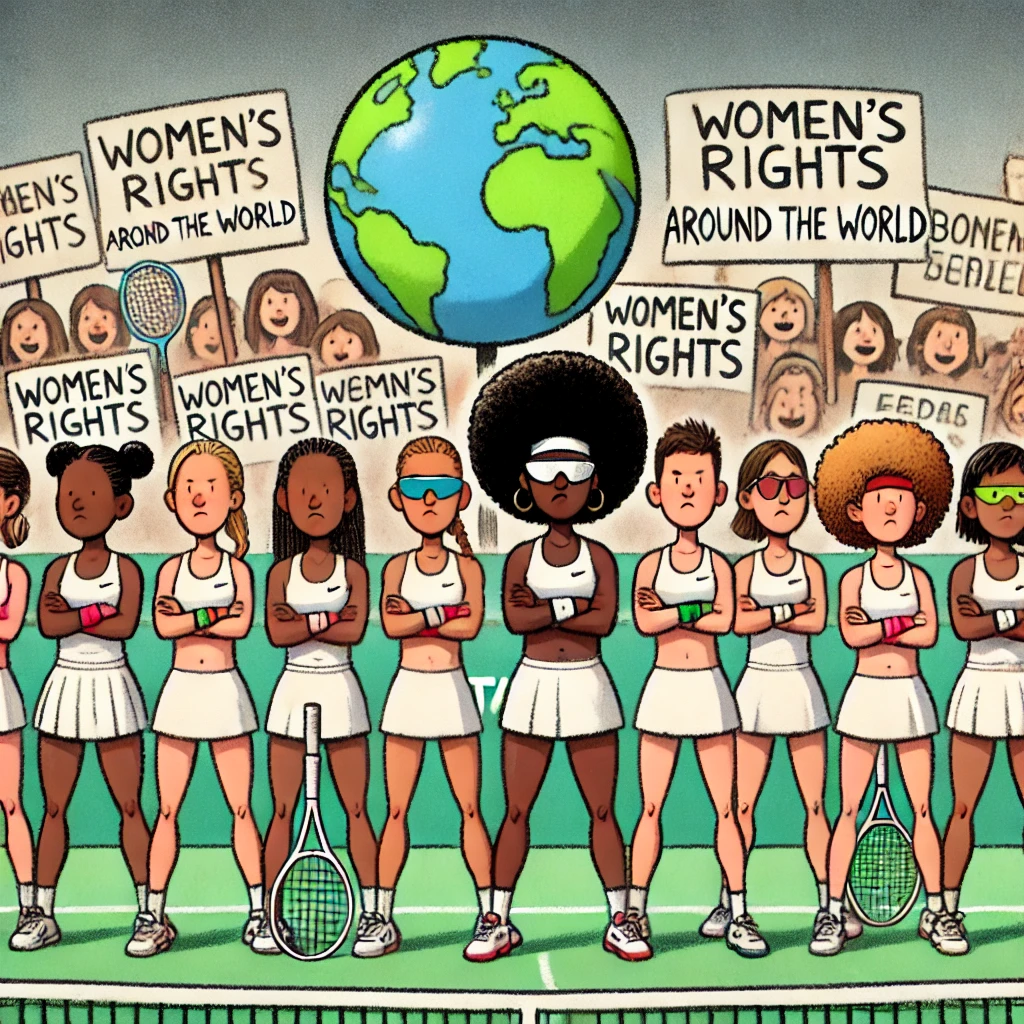The Women’s Tennis Association (WTA) has embarked on a historic but controversial journey by partnering with Saudi Arabia’s Public Investment Fund (PIF). While the partnership brings financial stability and pioneering benefits such as this week’s announced paid maternity leave, it has also sparked criticism for aligning with a nation widely criticized for its human rights record, particularly concerning women and LGBTQ+ rights. This special report delves into the complexities surrounding the WTA’s decision, the reactions of players, and the broader implications for women’s sports.
Sources that have helped to give this article an informed opinion:
- “Tennis: l’organisation des finales WTA en Arabie saoudite crée la controverse” – Le Monde – Louise Le Borgne: https://www.lemonde.fr/sport/article/2024/11/03/tennis-l-organisation-des-finales-wta-en-arabie-saoudite-cree-la-controverse_6373704_3242.html
- “WTA Finals in Riyadh: women’s tennis has become Saudi sportswashing tool” – The Guardian – Tumaini Carayol: https://www.theguardian.com/sport/2024/nov/01/womens-tennis-saudi-arabia-wta-finals
- “The WTA’s Maternity Leave Program: A Saudi-Backed Lifeline” – The New York Times – Charlie Eccleshare: https://www.nytimes.com/2024/11/02/wta-saudi-arabia-maternity-leave.html
Paid Maternity Leave as Groundbreaking Initiative
The WTA announced a new program offering paid maternity leave and access to fertility treatment grants, funded by the PIF. This initiative, the first of its kind in women’s sports, aims to provide financial security for up to 12 months of maternity leave. Players will also have access to grants for in vitro fertilization (IVF) and egg freezing. More than 320 players are expected to benefit, marking a significant step forward for women athletes who have long lacked such support.
Victoria Azarenka, a two-time Grand Slam champion and WTA Players’ Council member, praised the initiative, highlighting the need for financial stability for players who take a break to start a family. However, the fact that this landmark program is funded by Saudi Arabia raises ethical concerns. Critics argue that the kingdom is using sports partnerships to “sportswash” its international image, deflecting attention from ongoing human rights abuses.
Saudi Arabia’s Human Rights Record
Saudi Arabia’s human rights record, particularly regarding women and LGBTQ+ rights, has been a source of international criticism. The male guardianship system still restricts women’s freedoms, and activists who challenge the status quo often face severe consequences. Loujain al-Hathloul, a prominent women’s rights activist, was imprisoned for nearly three years and subjected to torture for advocating for the right to drive. Although released in 2021, she remains under travel restrictions and probation.
While Saudi Arabia has introduced reforms, such as allowing women to drive, easing travel restrictions, and promoting workforce participation, many of these changes are seen as surface-level. Women still need male permission for marriage and other significant life decisions, and many activists remain silenced. The kingdom’s ambitious Vision 2030 initiative aims to improve women’s participation in sports and public life, but real change remains slow and often symbolic.
Players’ Reactions: Lip Service or Genuine Support?
The response from WTA players has been mixed but generally cautious. Coco Gauff, a young and influential voice in tennis, expressed discomfort about playing in Saudi Arabia but stopped short of a strong condemnation. “If I feel uncomfortable or if I feel like nothing is changing in the country, then it’s likely I won’t return,” Gauff said. However, this stance lacks the firmness seen in other sports figures who have boycotted events over ethical concerns. Andy Murray refused to play exhibitions in Saoudi-Arabia.
Russian tennis player Daria Kasatkina, who publicly came out as gay in 2022, initially expressed reservations about competing in Saudi Arabia due to the country’s stance on LGBTQ+ rights. In July 2023, she stated, “It’s easier for the men because they feel pretty good there. We don’t feel the same way. Money talks in our world right now. For me, I don’t think that everything is about the money.”
However, by May 2024, Kasatkina’s position evolved after receiving assurances regarding her safety. She remarked, “I’ve been given guarantees that I’m going to be fine. If I qualify, it means that I am top eight in the world – it’s great news for me.” She also acknowledged Saudi Arabia’s efforts to promote sports: “We see that the Saudis now are very into the sport, they want to develop the sport. And as long as it gives the opportunity to the people there, and the young kids and the women to actually see the sport – so that they can watch it, they can play it, they can participate in this, I think it’s great.”
This shift highlights the complexities athletes face when balancing personal beliefs with professional opportunities.
Martina Navratilova, an outspoken critic of the WTA’s move, accused the WTA of losing its moral compass. “We have lost our morals when we decided to go there,” she told The New York Times. In contrast, Aryna Sabalenka endorsed the partnership, with Sabalenka praising Saudi Arabia’s “impressive efforts for women’s sport.” Such endorsements contribute to normalizing the kingdom’s influence, diluting critical voices.
WTA Players Choose Money Over Principles
The WTA Finals in Riyadh in 2024 highlighted the division within tennis over the Saudi partnership. All the top players, including Gauff, Sabalenka, Iga Swiatek, and Jessica Pegula, participated, despite the controversy. This lack of resistance from players underscores the financial allure of the $15 million prize pool, which matches the men’s ATP Finals. Even as Saudi Arabia’s broader involvement in sports grows, including deals with the ATP and high-profile ambassador roles like Rafael Nadal’s, dissent remains scarce.
The decision to hold the WTA Finals in Saudi Arabia has also been seen as a financial lifeline for the WTA. After pulling out of China due to the Peng Shuai case, the WTA faced financial uncertainty. Saudi Arabia’s lucrative offer provided much-needed stability, suggesting that the WTA might have prioritized survival over principles.
Words Are One Thing, Actions Another
Saudi Arabia’s funding of the WTA’s maternity leave initiative is part of a broader strategy to increase its presence in global sports. The kingdom has invested billions in events ranging from football and golf to Formula 1 and tennis. Proponents argue that such investments can promote progress, particularly for women’s rights in Saudi Arabia. However, critics see this as an attempt to distract from systemic abuses, including the imprisonment of women’s rights activists and the suppression of LGBTQ+ rights.
The WTA, under CEO Portia Archer, has largely sidestepped questions about Saudi Arabia’s human rights record, stating, “Questions about Saudi society are really not questions for me or the WTA. They’re questions for the Saudis to answer.” This response reflects a strategic avoidance of controversy but also raises questions about the organization’s ethical stance.
Our Conclusion
The WTA’s partnership with Saudi Arabia is a pivotal moment that tests the organization’s commitment to its own values. While financial stability and the introduction of paid maternity leave are laudable achievements, they should not come at the cost of turning a blind eye to systemic oppression. Women’s sports have always been a platform for equality and empowerment, but true progress means standing with women everywhere—not just when it’s convenient. As female athletes break barriers on the court, they must also recognize their influence off it. The silence of those with a platform is as telling as the voices of dissent. It is time for the WTA and its players to show real solidarity with women who continue to fight for basic freedoms, proving that the legacy of pioneers like Billie Jean King is more than just a story of past victories but a call to action for today.

